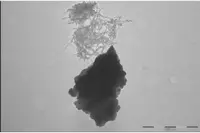Peptides could result in better Li-ion batteries
 While nanostructured electrodes in Li-ion batteries have several advantages over bulk material electrodes, including shorter distances for charge-carrying particles to travel and a high surface area, battery researchers find it difficult to work with nanoscale materials. However, researchers at the University of Maryland, Baltimore County (UMBC) have isolated a peptide which binds strongly to nanosized particles of lithium manganese nickel oxide (LMNO), improving the potential power and stability of the compound when used as an electrode.
While nanostructured electrodes in Li-ion batteries have several advantages over bulk material electrodes, including shorter distances for charge-carrying particles to travel and a high surface area, battery researchers find it difficult to work with nanoscale materials. However, researchers at the University of Maryland, Baltimore County (UMBC) have isolated a peptide which binds strongly to nanosized particles of lithium manganese nickel oxide (LMNO), improving the potential power and stability of the compound when used as an electrode.
"Biology provides several tools for us to solve important problems," said Evgenia Barannikova, a graduate student at UMBC. "By mimicking biological processes, we can find the better solution."
Barannikova and her colleagues used a procedure called 'Phage Display' to screen more than 1billion possible peptides in search of one that would stick strongly to LMNO. The researchers then combined the newly discovered peptide with a previously isolated peptide that binds to carbon nanotubes, which can serve as conductive nanowires in Li-ion electrodes.
The resulting peptide could form a bridge, binding to LMNO nanoparticles and to carbon nanotubes, keeping them close enough to maintain a connection through multiple charging cycles. In this way, the researchers expect the peptide will improve the power and cycling stability of future Li-ion batteries, allowing them to be smaller and maintain longer lifetimes.
Now, Barannikova plans to make an anode using similar techniques and to integrate the two components.
Author
Graham Pitcher
Source: www.newelectronics.co.uk
 While nanostructured electrodes in Li-ion batteries have several advantages over bulk material electrodes, including shorter distances for charge-carrying particles to travel and a high surface area, battery researchers find it difficult to work with nanoscale materials. However, researchers at the University of Maryland, Baltimore County (UMBC) have isolated a peptide which binds strongly to nanosized particles of lithium manganese nickel oxide (LMNO), improving the potential power and stability of the compound when used as an electrode.
While nanostructured electrodes in Li-ion batteries have several advantages over bulk material electrodes, including shorter distances for charge-carrying particles to travel and a high surface area, battery researchers find it difficult to work with nanoscale materials. However, researchers at the University of Maryland, Baltimore County (UMBC) have isolated a peptide which binds strongly to nanosized particles of lithium manganese nickel oxide (LMNO), improving the potential power and stability of the compound when used as an electrode.